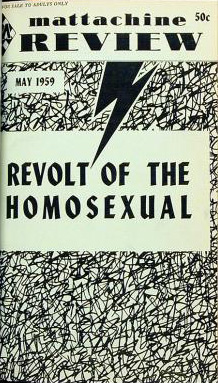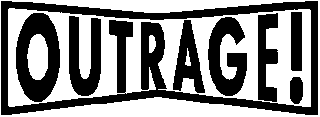Related Research Articles

Lesbian, gay, bisexual, transgender and queer (LGBTQ) movements are social movements that advocate for LGBTQ people in society. Although there is not a primary or an overarching central organization that represents all LGBTQ people and their interests, numerous LGBT rights organizations are active worldwide. The first organization to promote LGBT rights was the Scientific-Humanitarian Committee, founded in 1897 in Berlin.

The Mattachine Society, founded in 1950, was an early national gay rights organization in the United States, preceded by several covert and open organizations, such as Chicago's Society for Human Rights. Communist and labor activist Harry Hay formed the group with a collection of male friends in Los Angeles to protect and improve the rights of gay men. Branches formed in other cities, and by 1961 the Society had splintered into regional groups.

The Daughters of Bilitis, also called the DOB or the Daughters, was the first lesbian civil and political rights organization in the United States. The organization, formed in San Francisco in 1955, was initially conceived as a secret social club, an alternative to lesbian bars, which were subject to raids and police harassment.

OutRage! was a British political group focused on lesbian and gay rights. Founded in 1990, the organisation ran for 21 years until 2011. It described itself as "a broad based group of queers committed to radical, non-violent direct action and civil disobedience" and was formed to advocate that lesbian, gay and bisexual people have the same rights as heterosexual people, to end homophobia and to affirm the right of queer people to their "sexual freedom, choice and self-determination".

Gay Liberation Front (GLF) was the name of several gay liberation groups, the first of which was formed in New York City in 1969, immediately after the Stonewall riots. Similar organizations also formed in the UK, Australia and Canada. The GLF provided a voice for the newly-out and newly radicalized gay community, and a meeting place for a number of activists who would go on to form other groups, such as the Gay Activists Alliance, Gay Youth New York, and Street Transvestite Action Revolutionaries (STAR) in the US. In the UK and Canada, activists also developed a platform for gay liberation and demonstrated for gay rights. Activists from both the US and UK groups would later go on to found or be active in groups including ACT UP, the Lesbian Avengers, Queer Nation, Sisters of Perpetual Indulgence, and Stonewall.

The Campaign for Homosexual Equality (CHE) was a membership organisation in the United Kingdom with a stated aim from 1969 to promote legal and social equality for lesbians, gay men and bisexuals in England and Wales. Active throughout the 1970s – and becoming a mass-membership organisation during this time – CHE's membership declined in the 1980s.

The London Lesbian and Gay Centre was a lesbian and gay community centre located at 67–69 Cowcross Street, London. It was established in 1985 by the Greater London Council (GLC), which donated three-quarters of a million pounds to its establishment.

The gay liberation movement was a social and political movement of the late 1960s through the mid-1980s in the Western world, that urged lesbians and gay men to engage in radical direct action, and to counter societal shame with gay pride. In the feminist spirit of the personal being political, the most basic form of activism was an emphasis on coming out to family, friends, and colleagues, and living life as an openly lesbian or gay person.

Canadian lesbian, gay, bisexual, and transgender (LGBTQ) rights are some of the most extensive in the world. Same-sex sexual activity, in private between consenting adults, was decriminalized in Canada on June 27, 1969, when the Criminal Law Amendment Act, 1968–69 was brought into force upon royal assent. In a landmark decision in 1995, Egan v Canada, the Supreme Court of Canada held that sexual orientation is constitutionally protected under the equality clause of the Canadian Charter of Rights and Freedoms. In 2005, Canada became the fourth country in the world, and the first in the Americas to legalize same-sex marriage. In 2022, Canada was the third country in the world, and the first in North America, to fully ban conversion therapy nationwide for both minors and adults.
The Society for Human Rights was an American gay-rights organization established in Chicago in 1924. Society founder Henry Gerber was inspired to create it by the work of German doctor Magnus Hirschfeld and the Scientific-Humanitarian Committee and by the organisation Bund für Menschenrecht by Friedrich Radszuweit and Karl Schulz in Berlin. It was the first recognized gay rights organization in the United States, having received a charter from the state of Illinois, and produced the first American publication for homosexuals, Friendship and Freedom. A few months after being chartered, the group ceased to exist in the wake of the arrest of several of the Society's members. Despite its short existence and small size, the Society has been recognized as a precursor to the modern gay liberation movement.

The Hall–Carpenter Archives (HCA), founded in 1982, are the largest source for the study of gay activism in Britain, following the publication of the Wolfenden Report in 1957. The archives are named after the authors Marguerite Radclyffe Hall (1880–1943) and Edward Carpenter (1844–1929). They are housed at the London School of Economics, at Bishopsgate Library –, and in the British Library.

LGBT movements in the United States comprise an interwoven history of lesbian, gay, bisexual, transgender and allied social movements in the United States of America, beginning in the early 20th century. A commonly stated goal among these movements is social equality for LGBT people. Some have also focused on building LGBT communities or worked towards liberation for the broader society from biphobia, homophobia, and transphobia. LGBT movements organized today are made up of a wide range of political activism and cultural activity, including lobbying, street marches, social groups, media, art, and research. Sociologist Mary Bernstein writes: "For the lesbian and gay movement, then, cultural goals include challenging dominant constructions of masculinity and femininity, homophobia, and the primacy of the gendered heterosexual nuclear family (heteronormativity). Political goals include changing laws and policies in order to gain new rights, benefits, and protections from harm." Bernstein emphasizes that activists seek both types of goals in both the civil and political spheres.

Kenneth Robert Livingstone is an English retired politician who served as the Leader of the Greater London Council (GLC) from 1981 until the council was abolished in 1986, and as Mayor of London from the creation of the office in 2000 until 2008. He also served as the Member of Parliament (MP) for Brent East from 1987 to 2001. A former member of the Labour Party, he was on the party's hard left, ideologically identifying as a socialist.

Section 28 or Clause 28 was a legislative designation for a series of laws across Britain that prohibited the "promotion of homosexuality" by local authorities. Introduced by Margaret Thatcher's Conservative government, it was in effect from 1988 to 2000 in Scotland and from 1988 to 2003 in England and Wales. It caused many organisations such as lesbian, gay, bisexual and transgender student support groups to close, limit their activities or self-censor.
This is a timeline of notable events in the history of the lesbian, gay, bisexual and transgender (LGBT) community in the United Kingdom. There is evidence that LGBT activity in the United Kingdom existed as far back as the days of Celtic Britain.
This article gives a broad overview of lesbian, gay, bisexual and transgender (LGBT) history in Canada. LGBT activity was considered a crime from the colonial period in Canada until 1969, when Bill C-150 was passed into law. However, there is still discrimination despite anti-discrimination law. For a more detailed listing of individual incidents in Canadian LGBT history, see also Timeline of LGBT history in Canada.
The Greater London Council leadership of Ken Livingstone refers to the period during which Ken Livingstone, a British Labour Party politician, was Leader of the Greater London Council (GLC). Livingstone took up the post on 17 May 1981, and remained in office until the GLC was abolished on 1 April 1986.
Lesbians Against Pit Closures (LAPC) were an alliance of lesbian women who came together to support the National Union of Mineworkers and various mining communities during the UK miners' strike of 1984–1985. They were formed after a schism in the Lesbians and Gays Support the Miners (LGSM) movement, in November 1984. Members of the organisation were involved in picket line protests against the delivery of coal to the factories by strikebreakers.
The Gay and Lesbian Organization of Witwatersrand (GLOW) was a non-governmental organization in South Africa that focused on gay and lesbian community issues.

The following is a timeline of lesbian, gay, bisexual, and transgender (LGBT) history in the 20th century.
References
- 1 2 3 Brooke, Stephen (24 November 2011). Sexual Politics: Sexuality, Family Planning, and the British Left from the 1880s to the Present Day. OUP Oxford. pp. 238–239. ISBN 978-0-19-956254-1.